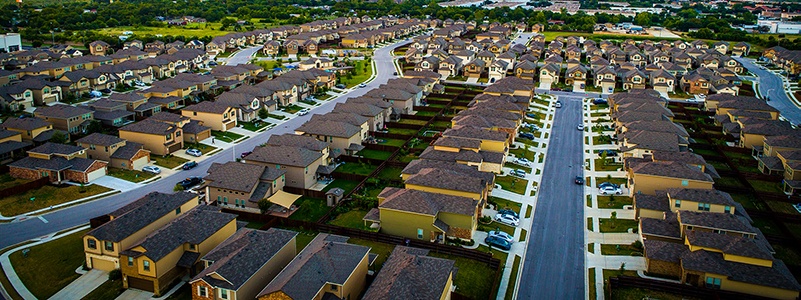
A Homeowners Association (HOA) is a self-governed organization within communities where homeowners collectively pay fees for maintaining the neighborhood's "common interest." Typically, HOAs are resident-run, and community members elect a board of directors that oversee the management of the HOA.
These neighborhoods can house a range of property types, from individual houses, townhouses, high-rises, or condos. Therefore, the rules and regulations of the HOA can vary depending on the property type.
So before buying a home in an HOA community, there are crucial things you must consider about these neighborhoods. Especially when it comes to how exactly an HOA runs the community and which strict rules you will have to live by.

What Does An HOA Do?
HOAs set rules for the neighborhood to protect and preserve the property value through “Covenants, Codes, and Restrictions,” also known as CCRs. These covenants impose limitations on property that restrict how that property can be used. These limitations can include the color of a home, additional structures such as patios or decks, and the storing of vehicles on the property.
What Are Common HOA Fees?
Within the rules of most HOAs, there are fees associated with the properties. If you are against paying fees that could potentially increase, ask your agent how much these fees could potentially cost. These fees can include:
* Utilities
* Trash removal
* Snow removal
* Fitness Center
* Security Officers
* Pool maintenance
* Fire alarm systems
* Pest control for common areas
* Grounds maintenance and landscaping

The Pros and Cons of an HOA
As with any community, there are positives and negatives of living there. On the other hand, these neighborhoods are beautifully cared for and visually appealing.
So is an HOA community right for you or your family? Check out the pros and cons of these neighborhoods to find out!
Pros
If you can appreciate a well-maintained neighborhood with potential amenities like swimming pools, parks, and even tennis courts, an HOA may interest you. But what about essential services that keep the neighborhood and your home up to standard? Here are some pros of living in an HOA community!
* Repairs and Services: Some communities offer exterior repairs and services such as trash and snow removal. Some HOAs will make repairs on your home and shared areas of the community. These can include electrical, plumbing, lighting, and security systems.
* Landscaping: Depending on the HOA, you can either maintain your own lawn or opt into landscaping services that are provided. If you allow landscapers to be hired by the HOA, you will ensure that the HOA’s requirements for landscaping are met.
* Noise Management: If a neighbor isn’t following the rules by throwing a large party or being noisy in general, you don’t have to go knocking on anyone’s door. Some HOAs handle these kinds of community nuisances.
* Pest Control: Insects aren't the only pests that need prevention. Consider raccoons getting into trash bins or stray animals roaming around. In an HOA, many times they'll go the extra mile to prevent these issues. So you don't have to chase down animals or worry about handling an insect infestation yourself.
* Security: HOAs can provide residents with a high sense of community through security and by hosting events where residents can get to know each other. These get-togethers can help foster better relationships between neighbors and create a higher sense of community trust. Some communities have outdoor cameras or provide security officers to add an extra layer of comfort.

Cons
No matter how great an HOA sounds, there are always cons to living in these communities. Although it depends on your personal preferences with following strict rules, certain aspects might drive you out. Here we’ll explore some of the cons of living in these communities.
* Restrictive Exterior Design: When you sign your HOA agreement, some major rules may apply to the exterior of your home. If you want to paint the exterior, you will likely need to consult with the HOA first. These communities are often pretty strict when it comes to the outside appearance of everyone’s homes, so even leaving a garbage can outside where your neighbors can see it can potentially cause an issue.
* Pet Rules: Although pets are welcome in most HOAs, there are different rules and limitations in each community. Common restrictions include the number of pets you can own, as well as their breed and size. These limitations ensure that pets do not disturb other residents. In addition, some HOAs have limits on certain dog breeds considered as “potentially dangerous” under local or state law.
You may have to register your pet before moving into the HOA community. Registration assures the HOA that your pet is licensed and has its required vaccinations. As for service animals, individuals with a physical, mental, or emotional disability can keep them under Federal Housing and Disability Protection Laws.
* Fines for Breaking Minor Rules: You may have heard about some intense, strict rules, but HOAs can fine you for infringing on their policies. In rare instances, homeowners have found themselves facing fines for minor infractions, some up to $100k or more.
These homeowners found themselves in trouble from flying a small American flag and planting flower beds that were unapproved by the HOA.
* Expensive Fees: HOA fees are not part of your mortgage, so check your CCRs to know what would happen if you couldn't pay your fees. These fees can range from $100 to $500 a month, but rarely they can range up to $2,000 or more depending on the property and services offered. When considering living in an HOA community, be cautious with your finances before agreeing to the fees associated with your potential home.
* Conflicts with HOA Board: The elected HOA board members are tasked with general administration powers, including implementing the rules. If members are working well together and with the homeowners in the community, it helps keep the area orderly and peaceful.
However, if there is a conflict between board members or homeowners, major issues can arise. For example, some board members may not fulfill their obligation by skipping meetings or could potentially single out certain community members. Although the community can organize and reelect another member, it can be challenging to replace board members.

FAQs
As a potential homebuyer, you might be wondering about the HOA rules and required fees for the community. Here are the most frequently asked questions to help you weigh the options of joining an HOA community.
Are There Different Types of HOAs?
HOAs come in a variety of different housing types, each with its own rules and regulations. There are condo HOAs, townhouse HOAs, and single-family home HOAs. Whether you live alone or with your family, there's a perfect HOA home out there for your needs!
Condo HOAs are like apartments, except you own the interior property. So you won't be renting the space. The HOA owns the exterior and all of the common areas in the building. These HOAs tend to have the strictest rules, from parking to what decorations you can display on the exterior. The HOA will handle any fitness centers, pools, parking garages, and storage units.
Townhouse HOAs are single-family homes, typically with two floors and one shared wall with another townhouse. These HOAs are primarily found in urban areas with less land and higher housing prices. These HOAs have some similar amenities that Condo HOAs provide, but they're not as strict. In addition, because you own the interior and exterior of your townhouse, you have more control over what you can do with it.
Although there may be rules about landscaping, you can usually put up decorations without inadvertently causing an issue. The townhouse may also include a pool, clubhouse, and fitness center that the HOA will manage.
Single-family home HOAs are becoming more common, especially in the Southern and Western parts of the United States. These detached single-family homes are within planned HOA communities that include amenities like a pool, community center, gym, or even a playground. Some of these communities are made with retirees in mind to meet their needs.
In these HOA communities, you are typically responsible for the upkeep of your home, yard, and insurance. However, these HOAs can still be strict and regulate just about everything you can do outside your home. These rules can include what types of trees and plants you can have in your yard to whether you can keep your garage door open during the day.
Therefore, research is crucial with these HOA communities to determine if you would be willing to follow the strict rules.

Who Runs the HOA?
Most often, HOAs are comprised of board members who live in the community. However, some HOAs operate through a real estate developer or property manager. If you're new to a community, attending HOA meetings is a great way to learn the ins and outs of what the board members do for the community.
What Amenities Are Included?
A portion of your HOA fees helps pay for amenities in the community. So if you're thinking of buying a home in one of these communities, do some research to find out what amenities are included.
For example, some communities have essential amenities like trash removal and landscaping, but what about extra perks like a pool or clubhouse? Does the community provide security officers, or is it gated?
Every community is slightly different, so not all amenities will be the same. However, planning out your finances depending on these amenities is a great start to plan ahead.

How Does the HOA Handle Finances?
Most HOAs have a reserve fund to benefit the community, such as making repairs to homes and common areas. Check with the HOA to make sure the particular neighborhood you're looking at has sufficient funds. You don't want to move into an HOA community whose board members aren't responsible for saving the fund.
Ask if the HOA has any debt accrued if they have had legal judgments against them, and how often annual assessments are raised, and by how much. When moving into an HOA community, you must ensure that their board members are financially responsible and have a solid record of serving the community.
How Involved Are the HOA in the Community?
The one way to find out how involved and hands-on the HOA is within the community is where some internet sleuthing skills are helpful. First, search through Facebook and Nextdoor groups for the neighborhood you're looking at to see what residents say about the area.
Then, if you want to get to the nitty-gritty to see how residents or former residents feel about the community, check out Google Reviews or Yelp.

What Are the Rules and Bylaws of The HOA?
If you're interested in making an offer on a home, ask your real estate agent to request a copy of the HOA's bylaws and its CCR document that outlines the community's rules. You might find this information online, but having a physical copy is beneficial to refer back to quickly. Then, read the documents to ensure that you understand the HOA rules and bylaws to consider living with the strict regulations.
What About New Projects and Amenities?
HOA communities can expand their amenities, so ask if there are any projects planned for the future. For example, if the HOA promises a new pool or improved clubhouse, ask about the funding and when construction will begin. You can also find out how many other projects are in the planning phase and how they may affect your annual fees so you can prepare your budget.
HOA communities offer clean, well-maintained neighborhoods with helpful services like landscaping and home repairs that you wouldn't get from a community without one. However, communities without an HOA allow you to decorate your home however you'd like. Plus, regular communities don't have the hefty HOA fees.
To find out if an HOA community is suitable for you or your family, seek out online groups with reviews of a particular neighborhood and research the HOA rules. Every community has its own rules, but one thing remains the same: you must follow them and pay the fees.
There are many positives and negatives to consider, but you can prepare for this decision by researching and asking former and current HOA residents for their opinions. Then, you can learn more about home buying from BHGRE HomeCity!










